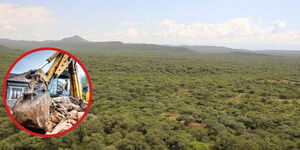The government on Wednesday announced the shutting down of 3,000 companies including illegal miners and mineral dealers after a four-year audit.
The closing of the companies was announced by Mining Cabinet Secretary Salim Mvurya after the lifting of a moratorium imposed in 2019 to allow the mapping of the country's mineral resources.
At the time, President Uhuru Kenyatta's administration argued that the suspension was to protect the interests of Kenyans and investors in the mining sector.
"During the moratorium, the government undertook significant reforms that have continued to inspire the Mining Sector and make mining viable, and economical and achieve aspirations of contributing 10% to GDP by 2030," Mvurya announced during the lifting of the ban.
Of the 3,000 operations stopped, Mvurya noted that the number would likely increase as the government had already profiled all illegal miners and operators.
"Enforcement has been beefed up through the Regional Mining Offices. The Ministry setting up an enforcement team in collaboration with other government agencies in fighting the vice," Mvurya stated.
The move by the Ministry of Mining to shut the 3,000 operations was made a day after the Cabinet recommended a crackdown on illegal mining operations in Kenya.
"The (cabinet) meeting declared mineral smuggling as an economic crime and approved the establishment of a special unit dedicated to compliance and enforcement against illegal mining and mineral smuggling," a dispatch from the cabinet read in part.
Mvurya further announced that his Ministry had undertaken a comprehensive audit of all mineral rights holders with a view to rooting out non-compliant rights.
"The government has revoked 1546 licences that do not meet the conditions of licensing," the CS revealed.
Kenya stopped issuing mining licenses in 2019 to allow the country to develop a digital database of minerals after an aerial geological survey by the Ministry of Mining.
The ministry also suspended the renewal of licenses in 2015, something that has seen some investors flee after frustrations from the government and local communities.
The freeze in renewal of licenses and exploration saw investments in the sector drop, cutting its contribution to the country's GDP.
“The moratorium probably negatively impacted on the mining sector development, but once we lift it we hope all applications will be processed quickly and efficiently,” Principal Secretary for Mining Elijah Mwangi noted in April.












